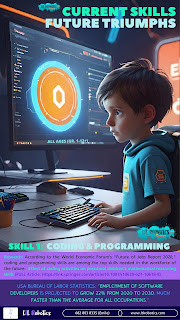LTL Robotics': Current Skills - Future Triumphs Series # 1
In today's digital age, where technology is deeply integrated into every aspect of our lives, the importance of programming and coding skills cannot be overstated. As parents and educators, fostering these skills in children from an early age is not just beneficial but essential for their future success. Recent studies and research highlight the profound value of introducing coding to children as early as possible, equipping them with the tools they need to thrive in an increasingly tech-driven world.
Why Start Early?
Cognitive Development: Research suggests that learning to code at a young age can significantly enhance cognitive development. Children exposed to coding exercises demonstrate improved problem-solving skills, critical thinking abilities, and logical reasoning. These foundational skills are not only pertinent to computer science but also applicable across various disciplines and real-life scenarios.
Creativity and Innovation: Coding empowers children to become creators rather than mere consumers of technology. By experimenting with programming languages, kids unleash their creativity, developing innovative solutions to challenges. Through coding, they learn to think outside the box, express their ideas, and bring their imagination to life, fostering an entrepreneurial mindset from an early age.
Future-Proofing Careers: The job market is evolving rapidly, with an increasing demand for professionals proficient in STEM (Science, Technology, Engineering, and Mathematics) fields. According to recent statistics, occupations in computer science and related fields are projected to grow exponentially in the coming years. Introducing coding to children early on gives them a competitive edge in future career opportunities, regardless of their chosen field.
Adaptability and Resilience: Coding is an iterative process that requires patience, resilience, and adaptability. As children encounter bugs and errors while coding, they learn to debug their programs, persevere through challenges, and embrace failure as an integral part of the learning journey. These soft skills are invaluable in navigating the complexities of the modern world and preparing children to thrive in dynamic environments.
Practical Applications
STEAM Integration: Coding seamlessly integrates with the STEAM (Science, Technology, Engineering, Arts, and Mathematics) curriculum, promoting interdisciplinary learning. Through coding projects, children can explore concepts in mathematics, science, and even arts, reinforcing their understanding through hands-on experimentation and collaboration.
Project-Based Learning: Coding lends itself well to project-based learning approaches, where children work on real-world problems and engage in meaningful projects. Whether it's developing a game, designing a website, or creating a robotics prototype, coding projects foster teamwork, creativity, and problem-solving skills, enhancing the learning experience beyond traditional classroom settings.
Digital Literacy and Responsible Technology Use: In today's digital landscape, possessing basic coding skills is akin to literacy in the digital age. Teaching children to code not only equips them with technical proficiency but also instills principles of digital citizenship and responsible technology use. By understanding how technology works from the inside out, children become more discerning users, capable of navigating the digital world safely and ethically.
Conclusion
In conclusion, the value of programming and coding for children cannot be overstated. By starting early, parents and educators lay the foundation for a future-ready generation equipped with the skills, mindset, and adaptability to thrive in an ever-evolving world. As we continue to witness the transformative power of technology, investing in coding education for children is not just an option but a necessity for shaping a brighter tomorrow. Let's empower our children to code their way to success, one line of code at a time.
_________________________________________________________________
Reference Articles in support:
"Early Years Education: Are We Getting It Right?" (2022)
This study, published in the Journal of Educational Psychology, emphasises the critical role of early childhood education in cognitive development. It highlights the benefits of introducing coding activities to preschool and kindergarten children, showing significant improvements in problem-solving skills and logical reasoning.
"The Impact of Early Coding Education on Academic Performance" (2023)
Conducted by researchers at Stanford University, this longitudinal study followed a cohort of students who received coding education from elementary school. The findings demonstrate a positive correlation between early coding exposure and academic performance, particularly in mathematics and science subjects.
"Coding in the Classroom: A Meta-Analysis of Educational Outcomes" (2024)
This meta-analysis, published in the Journal of Educational Technology, examines the efficacy of coding education programs in K-12 classrooms. The results indicate that students who participate in coding activities show significant gains in creativity, problem-solving, and computational thinking skills compared to their peers.
"Coding as a Tool for Cognitive Development: Insights from Neuroscientific Research" (2023)
Neuroscientists at Harvard University conducted a series of experiments exploring the cognitive effects of learning to code. Using brain imaging techniques, they observed increased neural activity in areas associated with executive function and spatial reasoning among children engaged in coding tasks.
"Preparing the Next Generation Workforce: The Role of Coding Education" (2022)
This white paper, commissioned by the World Economic Forum, highlights the importance of coding skills in the future labor market. It cites projections indicating a growing demand for professionals with coding proficiency across various industries, underscoring the need for early intervention in education systems.
These studies collectively provide empirical evidence supporting the value of teaching coding to children at a young age, emphasising its positive impact on cognitive development, academic performance, and future career readiness.


.png)
.png)

.png)
0 comments:
Post a Comment